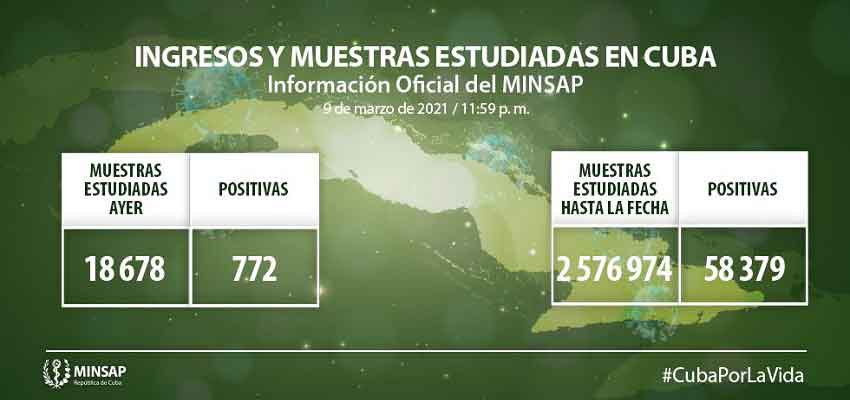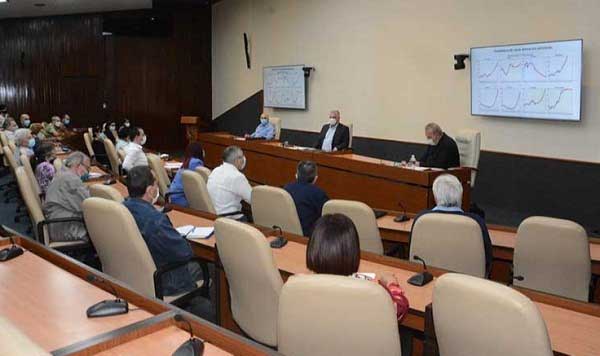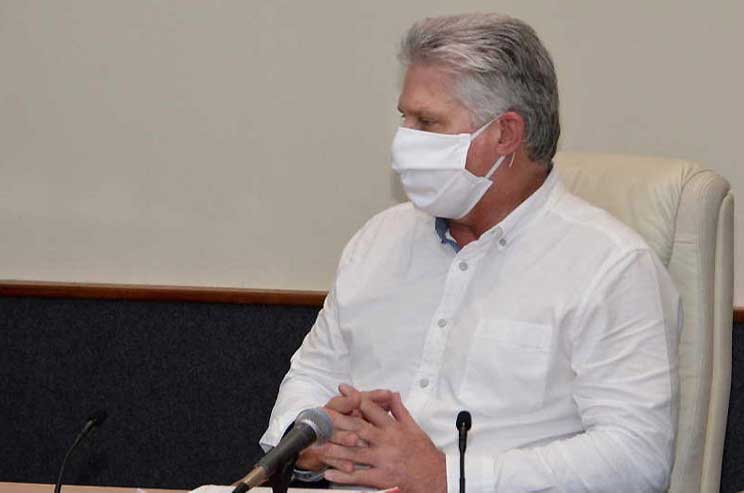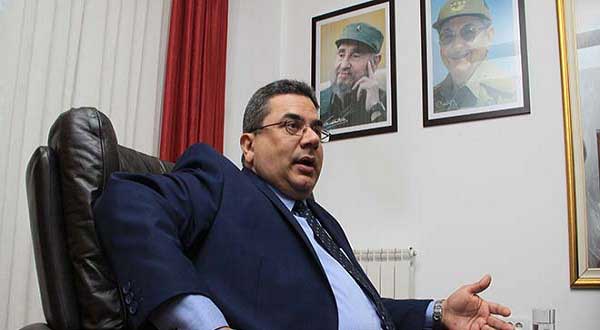
• Cuba reports 772 new COVID-19 infections in 24 hours • Cuba maintains follow-up protocol for COVID-19 convalescents, especially children • Cuban president says taking care of children with COVID is a priority • Cuban Ambassador to Serbia presents anti-COVID-19 vaccine program •
Cuba Reports 772 New COVID-19 Infections in 24 Hours
Cuba's National Director of Epidemiology, Dr. Francisco Durán, reported 772 new COVID-19 infections and five deaths from the coronavirus over the past 24 hours.
Havana, Cuba.- During his Wednesday morning press briefing, Dr. Durán said that the rate of positive cases of COVID is down from yesterday's report, but still very high. He was reporting on the data available up to 12 midnight last night, Tuesday, March 7.
Cuba Maintains Follow-up Protocol for COVID-19 Convalescents, Especially Children
 At a meeting in Havana between Cuban President Miguel Díaz-Canel and scientists and experts involved in the fight against the COVID pandemic, it was confirmed that the island is maintaining a follow-up protocol for those convalescing and possible after-effects of the coronavirus, with an emphasis on minors.
At a meeting in Havana between Cuban President Miguel Díaz-Canel and scientists and experts involved in the fight against the COVID pandemic, it was confirmed that the island is maintaining a follow-up protocol for those convalescing and possible after-effects of the coronavirus, with an emphasis on minors.
Dr. Lissette López, head of the National Pediatrics Group, explained the actions taken with pediatric patients to minimize the psychological and physical traces of the disease and to provide differentiated care for their reincorporation into society.
She recalled that a study carried out in the central province of Villa Clara detected cardiovascular conditions such as myocarditis, pericarditis, effusions and rhythm disturbances in more than 20% of the cases evaluated.
Meanwhile, in other provinces, they found blood pressure problems, neurological disorders, respiratory, renal, and hematological damage.
Cuba reported a child with Multi-Systemic Inflammatory Syndrome, two patients with Kawasaki Disease, and an adolescent with Hemophagocytic Syndrome, all linked to COVID-19 - all who are evolving favorably.
Because of this scenario, Dr. López insisted on the need to prevent minors from becoming ill, a trend that has been increasing in the last few months, and in the last 48 hours alone 270 new cases were registered.
He emphasized that infants are at greater risk because they depend entirely on the care of the family and society.
In Cuba, no child has died from COVID-19, but 51 have required intensive care, added the head of the National Pediatrics Group.
At the meeting, they also presented a study of convalescents in the adult population, carried out at the Hermanos Ameijeiras Hospital in Havana, which showed sequelae in half of those evaluated, such as fatigue, pain and difficulty in breathing.
Also, loss of taste, sweating and nausea, said Dr. Emilio Buchaca, deputy director of the hospital, who added the detection of biomarker alterations and pulmonary lesions.
Dr. Ileana Morales, director of Science and Technological Innovation of the Ministry of Public Health, spoke of the responsibility of the healthcare personnel working in the community with the application of the protocol for those who have had the disease, currently, 91.4 percent of the more than 57,000 diagnosed.
This work includes conducting new clinical trials with this group, such as the phase II trial of the Soberana Plus vaccine candidate; the application of stem cells and Jusvinza peptide to patients with lung lesions.
Cuba is still under stress due to COVID-19, and according to the forecast models, the country will maintain a plateau of 600 to 1,000 daily cases, due to the high transmission.
Cuban President Says Taking Care of Children with COVID Is a Priority
 Cuban President Miguel Díaz-Canel stressed on Wednesday that experts are studying the effects of COVID-19 in younger patients. On his Twitter account, he noted that in one year of the pandemic, neither children nor adolescents have died from this disease in the country, however, more than 6,300 have been infected - and 270 in the last 48 hours.
Cuban President Miguel Díaz-Canel stressed on Wednesday that experts are studying the effects of COVID-19 in younger patients. On his Twitter account, he noted that in one year of the pandemic, neither children nor adolescents have died from this disease in the country, however, more than 6,300 have been infected - and 270 in the last 48 hours.
The president received the information from Dr. Lissette López González, head of the National Pediatrics Group, during another meeting with scientists and experts working on confronting the new coronavirus.
Dr. López González commented that in this third wave of contagions, the number of pediatric patients requiring intensive care has been significant: 51, between serious and critical.
Referring to the after-effects on their mental health, she explained that of the 1,289 who have been studied, a little more than 32 percent developed risky behaviors when they became ill, such as over-consumption of technologies, rebellious and defiant behavior, willfulness, excessive attachment, irritability, fears and nightmares.
Another 14.1 percent had some psychopathology from the COVID-19 illness event, including separation anxiety disorders, depression, phobias, panics, and transient tics.
"With rapid therapeutic intervention, these problems have been reversed and there have been no permanent psychological sequelae," the doctor explained.
From the biological point of view, the impact of SARS-CoV-2 on the health of infants and adolescents has also been determined, which breaks the initial myths and shows that children do get sick and carry symptoms over time.
Cuban Ambassador to Serbia Presents Anti-COVID-19 Vaccine Program
 Belgrade.- "Cuban Vaccine Candidates: A New Hope against COVID-19" was the topic of an online appearance of the Cuban ambassador to Serbia, Gustavo Tristá del Todo.
Belgrade.- "Cuban Vaccine Candidates: A New Hope against COVID-19" was the topic of an online appearance of the Cuban ambassador to Serbia, Gustavo Tristá del Todo.
The "Ambassadors' Forum," organized by the Institute of International Politics and Economics of Belgrade, brought together in a virtual format several specialists and experts for the analysis and discussion of this important global issue.
The diplomat expressed his appreciation for the opportunity to present the Cuban story of obtaining and testing several vaccine candidates in different phases and highlighted the recent launch of the third phase of Soberana 02 this month.
Tristá del Todo explained the steps followed to develop five vaccine candidates: Soberana 01 and 02, Mambisa, Abdala, and Soberana Plus, as well as their technology platforms and application methods.
He also commented on the work in progress for the application of some of these drugs to children and adolescents, the only way to achieve the immunization of the entire population. (RHC)





